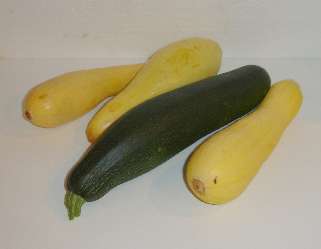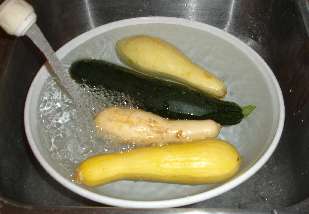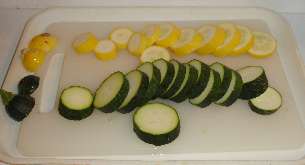
Looking for How to Freeze Breaded Zucchini and other Summer Squash - Easily! With Step-by-step Photos, Recipe, Directions, Ingredients and Costs in 2025? Scroll down this page and follow the links.
And if you bring home some fruit or vegetables and want to can, freeze, make
jam, salsa or pickles, see this
page for simple, reliable, illustrated canning, freezing or preserving
directions. There are plenty of other related resources, click on the resources dropdown above. If you are having a hard time
finding
canning lids, I've used these, and they're a great price &
ship in 2 days.
If you have questions or feedback, please let me know! There
are affiliate links on this page. Read our disclosure policy to learn more.
How to Freeze Breaded Zucchini and other Summer Squash - Easily! With Step-by-step Photos, Recipe, Directions, Ingredients and Costs
How to Freeze Breaded Zucchini and other Summer Squash, like Yellow Squash,
Crookneck, Pattypan, Straightneck, White Scallop, etc.)
Click here for a PDF print version
If you like frozen squash in the winter, just imagine how good it would taste
if you had picked a firm, fresh squashes yourself and then quickly sliced,
breaded them and froze them at
home! It is also one of the simplest ways to put up a vegetable for the
winter. Here's how to do it, complete instructions in easy steps and completely
illustrated. The squash will taste MUCH better than anything you've ever had
from a store. And you might like this recipe, too:
How to make Grilled Summer
Squash with Feta - which you can freeze for the winter, or serve fresh! If
you would rather freeze it already breaded, see this page.
Directions for Freezing Zucchini and other Summer Squash
Ingredients
- fresh zucchini or other summer squash - any quantity. I figure one medium sized
squash per serving (it does cook down)
- For every 2 small to medium zucchini (about 6 to 8 inches
long) you will need;
- 1 egg, mixed
2 tablespoons milk
1⁄2 cup Italian
breadcrumbs
2 tablespoons grated parmesan cheese
1
teaspoon Italian seasoning (or dried oregano)
Equipment
-
Vacuum food sealer or "ziploc" type freezer bags (the freezer bag
version is heavier and protects better against freezer burn.
-
cutting board
- 2 large bowls, one for the egg, the other for the bread crumbs.
- 1 sharp knife
Directions for Freezing Summer Squash
Step 1 - Get the squash!
Start with fresh squash - as fresh as you can get. If there is a
delay between harvesting and freezing, put it in the refrigerator or put
ice on it. Harvest before the seeds become mature and when color is still
uniformly dark
Step 2 - Wash the squash!
I'm sure you can figure out how to rinse the squash in
plain cold or lukewarm water using your hands and possibly a gentle
brush..
Step 3 - Prepare the egg mix
Whisk the egg, milk (and if you like, the garlic) in a
bowl and set aside for about 15 minutes to let flavors combine.
Step 4 - Prepare the breading
Mix the breadcrumbs, cheese, oregano or Italian seasoning and
pepper in another one bowl.
Step 5 - Slice the squash
Just take a sharp knife and cut of both ends (about 1/4 of an inch, or
half the width of an average woman's little finger)
Slice into
approximately 1/4-inch thick
slices.
Prepare quickly, (if you leave it sit out cut up for more than a half
hour, it will start to discolor).
Step 6 - Dip the slices in the egg mix, then the
bread cumbs
Dip the zucchini slices into the egg mixture, then
into crumbs and place into a freezer container (I like the 8 cup
Glad plastic containers) that has some wax paper laid on it.
Step 7 - Continue filling and layering
Continue filling the freezer container, separating each layer
with a piece of wax paper or plastic wrap.
Step 8 - Done!
Pop them into the freezer, on the quick freeze shelf, if you have one!
Freezing keeps summer squash safe to eat almost indefinitely, but the
recommended maximum storage time of 12 months is best for taste and quality. The
quality of the frozen summer squash is maintained best in a very cold
freezer (deep freezer), and one that keeps them frozen completely with no
thaw cycles. Excluding any air from inside the bags which leads to freezer
burn, by using vacuum-sealed bags, is also important to maintaining
quality
Tips:
- Harvest the squash at its peak maturity (firm, not limp or old)
- Process promptly after harvesting, or keep cooled in the fridge or with
ice until then.
- If the squash is watery when thawed, discard the liquid before using.
- An alternative method is to cook the squash first - using your favorite
recipe for a zucchini casserole, or sauteed squash, etc., and then simply
freeze the cooked squash! Of course, it does take up more room in your
freezer.
I love the FoodSavers (see
this page for more information) with their vacuum sealing! Here's an
example of one model:
FoodSaver V2840 Advanced Design
This one is the least expensive of the Food Saver models that has all the
advamced features, like automatic bag detection and sealing, which makes it
faster and easier to seal. And yes, you can seal and freeze foods with
liquids (just freeze the unsealed bag in the freezer overnight, THEN seal
it!)

About $135
 
Features
- Home vacuum-packaging system vacuums, seals, and shuts off
automatically
- Upright vacuum-sealing
appliance with SmartSeal technology keeps food fresh longer
-
Push-button operation;
built-in roll storage and cutter; automatic liquid detection
-
Crush-free instant seal;
2 vacuum speeds; 2 seal levels; progress lights; integrated
bag opener
-
Marinate and canister
modes; includes 3 quart-size bags, 2 gallon-size bags, and a
roll of bag material
-
Measures approximately 6
by 18-8/9 by 10-2/5 inches; 1-year limited warranty
|
Frequently Asked Questions
- How long can they be frozen?
It depends upon how cold is your freezer and how you packed them. Colder
(deep freezes) are better than frost free compartments, which actually cycle
above freezing (that's how they melt the ice). Vacuum packing results in
longer storage capability, too. Thicker bags also help prevent freezer
burn.
In general, up to 9 months in a ziploc bag in an ordinary freezer, and 14
months in a deep freeze in a vacuum packed bag. After that, they beans
won't make you sick; they just won't taste a s good.
- Hi, I have a question about yellow squash. I am a newby to growing
gardens but last year I did as said about the yellow squash (to freeze it).
I have a vacuum sealer (love it). But when I pulled a package of squash out
to eat it, it was so soggy. I also tried blanching for about a minute but it
was all the same. When I take it out of the freezer I just warm the whole
bag in water then open it. Just soggy. We like to eat it somewhat firm. I
was told to just wash it, cut the ends off and freeze it. Is this safe?
Yes, you can certainly freeze it without blanching. The purpose of blanching
prior to freezing is to stop the enzymes that degrade the flavor, it's not
for safety. As long as you eat the squash within 4 to 6 months, the flavor
should be ok. Freezing without blanching may reducing the sogginess of the
of the squash, but I doubt that it will help much. Freezing ruptures the
cell walls and that is primarily what causes the sogginess.
I blanch if I am going to store them for a long time or use it in
cooking. If I want to use a vegetable raw, and not keep it frozen for more
than a few months, then I skip the blanching, too. But it still nowhere near
as crisp as fresh.
- Why is canning summer squash or zucchini no longer
recommended by the USDA?
Recommendations for canning summer squashes, including zucchini, that
appeared in former editions of USDA guides have been withdrawn due to
uncertainty about the determination of processing times. Squashes are
low-acid vegetables and require pressure canning for a known period of time
that will destroy the bacteria that cause botulism. Documentation for the
previous processing times cannot be found, and reports that are available do
not support the old process. Slices or cubes of cooked summer squash will
get quite soft and pack tightly into the jars. The amount of squash filled
into a jar will affect the heating pattern in that jar. It is best to freeze
or pickle summer squashes, but they may also be dried.
Comments and Feedback
- Comments from a visitor on August 16, 2014: "Thank you so much for posting the instructions on how
to freeze summer squash. Very glad that I choose your website. Didn't know what
I was going to do with all the squash my husband brought home from his cousin's
garden. I just made a delicious chocolate zucchini cake and I froze the rest of
the squash for the future after following your prefect instructions. Genius ! "







